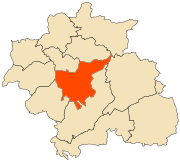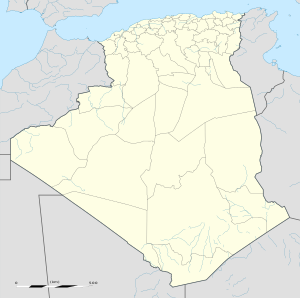Constantine District
|
Constantine قسنطينة |
||
|---|---|---|
| city | ||

The Sidi M'Cid Bridge in Constantine
|
||
|
||
| Nickname(s): City of Bridges | ||
 Location of Constantine within Constantine Province |
||
| Location of Constantine within Algeria | ||
| Coordinates: 36°21′N 6°36′E / 36.350°N 6.600°ECoordinates: 36°21′N 6°36′E / 36.350°N 6.600°E | ||
| Country |
|
|
| Province | Constantine Province | |
| District | Constantine District | |
| Government | ||
| • President | A. Chibane (2007–12) | |
| Area | ||
| • Total | 2,288 km2 (883 sq mi) | |
| Elevation | 694 m (2,277 ft) | |
| Population (2008)census | ||
| • Total | 448,374 | |
| • Density | 200/km2 (510/sq mi) | |
| Time zone | CET (UTC+1) | |
| Climate | Csa | |
Constantine (Arabic: قسنطينة, Qusanṭīnah, also spelled Qacentina or Kasantina, Arabic: Blad el-Hawa) is the capital of Constantine Province in north-eastern Algeria. During Roman times it was called Cirta and was renamed "Constantina" in honour of emperor Constantine the Great. It was the capital of the same-named French département until 1962. Slightly inland, it is about 80 kilometres (50 miles) from the Mediterranean coast, on the banks of the Rhumel river.
Regarded as the capital of eastern Algeria and the centre of its region, Constantine has a population of 448,374 (938,475 with the agglomeration), making it the third largest city in the country after Algiers and Oran. There are museums and important historical sites around the city.
It is often referred to as the "City of Bridges" due to the numerous picturesque bridges connecting the mountains the city is built on.
The city was originally created by the Phoenicians, who called it Sewa (royal city). Later it was renamed Cirta, by the Numidian king Syphax, who turned it into his capital. The city was taken over by Numidia, the country of the Berber people, after the Phoenicians were defeated by Rome in the Third Punic War. In 112 BC the city was occupied by Jugurtha who defeated his half-brother Adherbal. The city later served as the base for Roman generals Quintus Caecilius Metellus Numidicus and Gaius Marius in their war against Jugurtha. Later, with the removal of King Juba I and the remaining supporters of Pompey in Africa (c. 46), Julius Caesar gave special rights to the citizens of Cirta, now known as Colonia Sittlanorum.
...
Wikipedia


